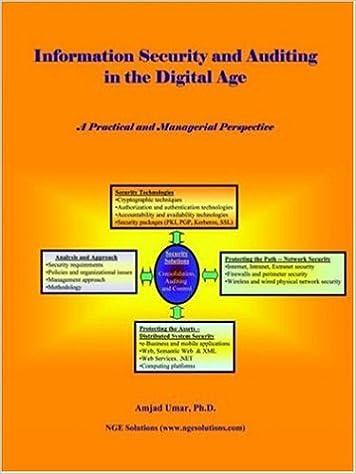Question
Discuss and comment on this professional ethics article: Depression Alert for Accounting Practitioners Professional Competence and Attitude By Thomas Chenoweth, coordinator@cpaethics.org, Oct. 24, 2007 Employers,
Discuss and comment on this professional ethics article:
| Depression Alert for Accounting Practitioners Professional Competence and Attitude By Thomas Chenoweth, coordinator@cpaethics.org, Oct. 24, 2007 Employers, managers, professional colleagues, clients, and federal and state regulators (especially state boards of accountancy) expect accounting professionals to exhibit professional competence and professional attitude at all times. In particular, accounting practitioners must observe state accountancy law and regulations when they apply for a CPA license, renew a CPA license, register a CPA firm, renew a CPA firm registration, enroll a CPA firm in peer review, address peer review issues, submit peer review paperwork, and when they participate in attest, tax, non-profit, fraud, ethics, and other professional continuing education activities. Accounting practitioners are human beings. They progress and regress along the human lifecycle. They celebrate college graduation, first accounting job, marriage, new house, birth of children, job promotions, high school graduation of children, college graduation of children, marriage of children, and retirement. They also face challenges: paying student loans, a mortgage, and child rearing costs; experiencing illness or premature death of children or spouse; being divorced; surviving business failure; appealing CPA license discipline; caring for elderly parents; and saving for retirement. Typical causes of accounting practitioner discipline heard by state boards of accountancy are: premature use of CPA credential, untimely CPA license renewal, insufficient continuing education hours, substandard continuing education, inaccurate reporting of continuing education hours, untimely completion of CPA firm peer review, GAAP and GAAS incompetence, untimely submission of CPA firm peer review paperwork, financial issues (untimely return of client records until engagement fee is collected), and moral character issues (embezzlement and shoplifting). Accounting practitioners who apply for CPA license reinstatement typically mention depression as the number one contributing factor to their professional indiscretions. They explain that they became overwhelmed by personal and business issues and shut down emotionally and physically. When they wake up after months of depression, they realize that they lost the privilege of using the CPA credential. Prior to their single act of unprofessional conduct, they had been a role model accounting professional for many, many years. They want to get back the financial opportunities and professional respect that the CPA credential provides. State boards of accountancy welcome rehabilitated accounting professionals to return to the accounting profession as licensed CPAs. However, the board staff and board members need documentation to support their decision to reinstate the CPA license. Formerly licensed accounting practitioners need to acknowledge their indiscretions, take full responsibility for their past actions, and ensure the board staff and board members that indiscretions will not likely occur again in the future. Also, they need to demonstrate recent professional competence through relevant work experience and professional education and they need to have a support team that will reinforce professional competence and professional attitude. Accounting professionals must understand that state boards of accountancy are charged by state legislatures to protect the professional reputation of the CPA credential and to serve the best interests of consumers. How can accounting practitioners best deal with depression and avoid CPA license discipline altogether? Prevention is worth an ounce of cure? Accounting students can enroll in a human lifecycle college course. CPAs can enter into a working relationship with a lifecycle coach (a reputable psychiatrist or psychologist) early in their careers to discuss the human lifecycle scenarios and healthy ways to address depression and stress. CPAs can keep in touch with their lifecycle coach over the years and ask for help when overwhelming lifecycle events occur. Also, CPAs can ask their employers human resources director about employer-sponsored programs that address personal and business depression and stress. Some accounting practitioners, early in their careers, adopt healthy lifestyles and need minimal professional counseling to address depression or stress triggered by lifecycle events. They have a positive attitude about themselves and everyone; eat well-balanced meals; sleep 8-10 hours each night; exercise three times a week, live on half of their annual salary; meditate daily in an unfurnished quiet room to let go of depression or stress; identify five miracles at the end of each day (recognize a higher power); participate in nature activities (appreciate the vastness and timelessness of the universe); and respect their mental, physical, and professional limitations. Most managers, professional colleagues, and clients daily make the assumption that your professional competence and professional attitude are intact. However, some may cordially ask you: How are you today? They are asking you in a tactful way whether your professional competence and professional attitude are intact. If you cannot reply with some assurance that you are fine, your inner self is telling you to get help from your lifecycle coach or your employers human resources director. For more information on the human lifecycle, ask your local bookstore concierge or local librarian. | ||||
Step by Step Solution
There are 3 Steps involved in it
Step: 1

Get Instant Access to Expert-Tailored Solutions
See step-by-step solutions with expert insights and AI powered tools for academic success
Step: 2

Step: 3

Ace Your Homework with AI
Get the answers you need in no time with our AI-driven, step-by-step assistance
Get Started


